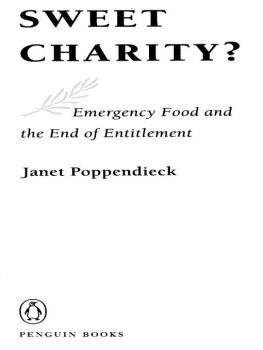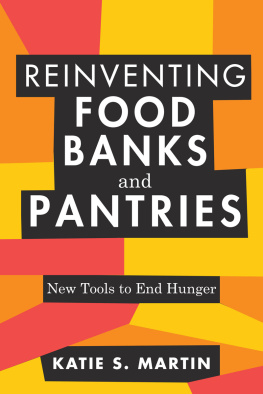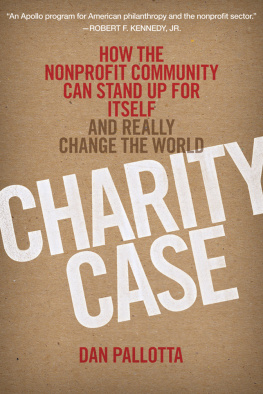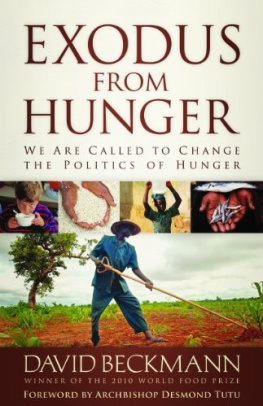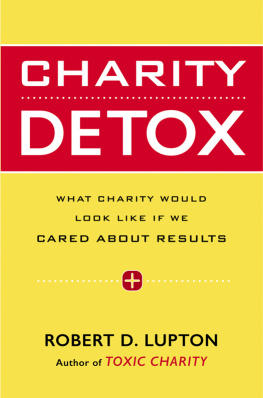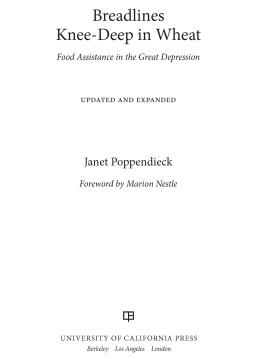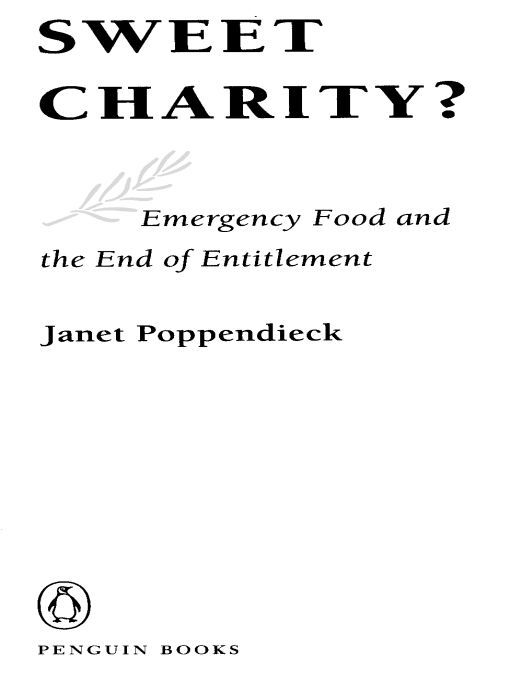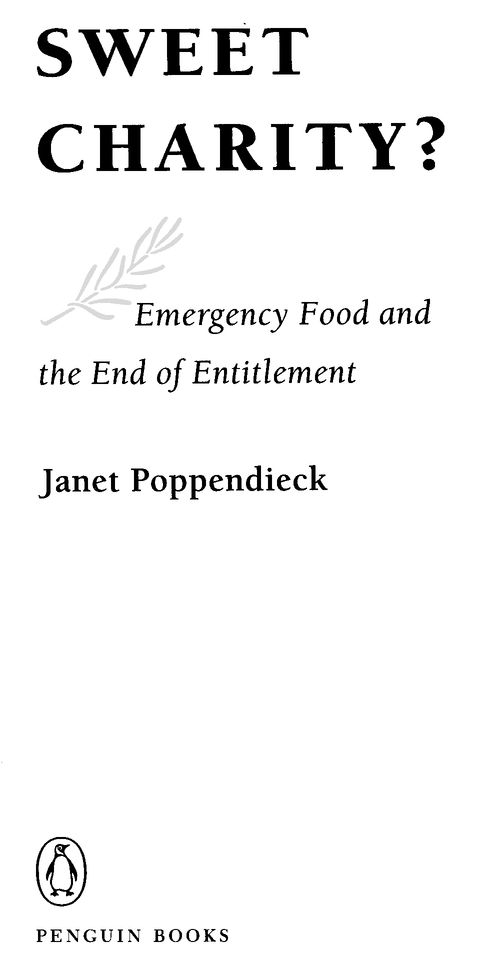Table of Contents
Praise for SweetCharity?
Anyone who has ever coordinated a school food drive, or even tossed a few boxes of macaroni into a donation bin at the supermarket, is likely to be taken aback by Sweet Charity?, a no-holds-barred critique of Americas emergency food system. Poppendieck convincingly argues that food programs are a Band-Aid solution to hunger, assuaging liberal guilt and at the same time reinforcing the benighted conviction that private charity is an adequate response to the problem.... A powerful work.
Chicago Tribune
Theres a great deal of information in Sweet Charity?, but its the stories that stay with you. Poppendiecks well-written, passionately argued book proves that seriousness does not have to be dull, that you can inform and still tell a good story. She raises difficult questions for many people of this countrythe ones who are still outraged by hunger and poverty in the midst of plenty. Sweet Charity? is truly food for thought.
San Jose Mercury News
Experienced caregivers across the country have been shouting about these problems for years. Its great to have such a well-researched book available thats shouting about them, too.
The Dallas Morning News
A book that reads not like a leaden opus from a serious academic but refreshingly like the work of a bright friend and good listener who knows a lot about an important topic ... Laudably evenhanded.
San Francisco Chronicle
The special genius of Sweet Charity? is Poppendiecks ability to combine insight into systemic failings with profound respect for individual moral commitments. She moves us to seek out ways that the impulse toward charity can be instructed by wisdom and transformed into a quest for justice.
The Christian Science Monitor
What is the meaning of charityspecifically emergency food programsin a wealthy society in which hunger could be eliminated if there were the will? Janet Poppendieck explores this urgent issue with historical acumen, an unusual depth of understanding, and concern for both the hungry and those providing sustenance. Sweet Charity? is a provocative, highly readable, and wise exploration of altruism, inequality, and the dilemmas of social policy in contemporary America.
Ruth Sidel, author of Keeping Women and Children Last
In Sweet Charity?, Jan Poppendieck addresses the central dilemma of American food assistance: how the drive for food donations to meet the immediate needs of the poor tends to divert private citizens from demanding decent public policies that would prevent hunger in the first place. This is a beautifully written, deeply compassionate work that breaks new ground in understanding the emotional basisas well as the history and economicsof public and private food assistance programs in the United States today. This is an instant classic that should influence thinking about welfare and hunger issues for years to come.
Marion Nestle, Ph.D., M.P.H., Professor and Chair of the Department of Nutrition Food Studies, New York University
Sweet Charity? is a profoundly disturbing, soul-searching analysis of the nations emergency food network. Our emergency response to hunger has become an institutional fixture, and Poppendieck argues that, laudable as it is, it plays into the hands of those who want to abandon governmental responsibility for ending hunger and poverty. Whether you agree or not, she has written a book that deserves to trigger a national debate. The first readers should be those at every food bank, soup kitchen, and food pantry.
Art Simon, Founder, Bread for the World
Sweet Charity? provides a brilliant and timely critique of the futility of emergency food programs and the need for a broader vision to obliterate poverty. Beautifully written and powerfully argued, Poppendieck speaks with great authority about the seductions of charity for many Americans at the same time she shows a wide range of people speaking for themselves. This important book needs to be read by anyone concerned about hunger and the harmful effects of ending welfare.
Lynn S. Chancer, Assistant Professor, Department of Sociology, Barnard College
Sweet Charity? bears important messages for volunteers and organizations fighting against hunger. An insightful, balanced, yet compassionate analysis, it argues persuasively that solutions to hunger and to other symptoms of inequality depend on transforming unjust into just societies.
David G. Gill, Professor of Social Policy, Director, Center for Social Change, Brandeis University
PENGUIN BOOKS SWEET CHARITY?
Janet Poppendieck is a professor of sociology at Hunter College of the City University of New York and director of its Center for the Study of Family Policy. She is the author of Breadlines Knee Deep in Wheat: Food Assistance in the Great Depression.
For Woody Goldberg
Acknowledgments
MANY PEOPLE have contributed to this book. First and foremost, I want to thank those whom I interviewed and observed at their work in the course of my research: the soup kitchen and food pantry volunteers and staff, the food bankers, the food rescuers, and the staff members in local and national advocacy organizations. Their generosity with time and their candor went far beyond what I had any right to expect. I am particularly grateful to Foodchain for permitting me to attend a national gathering on short notice, and to the staff at Second Harvest for sharing both their own histories and their perceptions of issues and trends, for providing access to national conferences, and for arranging an opportunity to interview board members. The participant observation aspect of this work has been enormously gratifying to me. It is not an exaggeration to say that I have spent some of the happiest hours of my adult life in the company of emergency food providers; their hospitality and their good humor as well as their creativity and dedication have left me full of admiration.
Purposely, I interviewed relatively few clients in this research. We have, on the whole, a great deal more information about poor people in such settings than we do about more privileged staff and volunteers, and I believe that we need to know more about the latter in order to understand how our society has made the transition from entitlements to charity that is explored in this book. Those clients whom I did interview, however, and others with whom I had brief conversations or shared meals, were singularly gracious and forthcoming.
Interviews would be of limited use were it not for careful transcription of tapes, and I had the assistance of several extraordinarily talented people in this task. Laura Konigsburg brought to the work of transcription not only her patience and skill, but also a lively interest in the subject, informed by her own research on services for homeless people in London and by years of volunteer work with a shelter and food pantry. She not only transcribed; she identified themes, provided annotations, and shared ideas. This project would not have been the same without her. Lynn du Hoffman also brought both great skill and real interest to bear and enriched the final product with her insights.
I could not have afforded the transcription, nor the trips to observe and interview in locations outside the New York area, had it not been for the generous support of the Aspen Institute Nonprofit Sector Research Fund and the Professional Staff Congress-City University of New York Faculty Research Award program. I am grateful to these funders, to the anonymous reviewers whose efforts make such funding possible, and to the staff of the CUNY Research Administration, especially Bob Buckley, for help in securing and administering these grants.

